Hiring management trainees is a critical task for companies looking to build their future leadership pipeline. Many organizations struggle with this process, often focusing too heavily on academic credentials while overlooking key soft skills and potential. The right management trainee can bring fresh perspectives, adaptability, and a strong drive to learn – qualities that are invaluable for long-term organizational success.
This comprehensive guide walks you through the process of hiring top-notch management trainees. We'll cover everything from crafting an effective job description to conducting insightful interviews and making the final selection. To start your hiring process on the right foot, consider using a management trainee assessment test to objectively evaluate candidates' skills.
Table of contents
What Do Management Trainees Do?
A Management Trainee is an entry-level professional who is being groomed to become a future leader within an organization. They rotate through various departments, gaining hands-on experience and understanding the workings of the business from the ground up.
Day-to-day tasks of a Management Trainee typically include:
- Assisting in various departments, such as finance, marketing, and operations, to understand their functions.
- Participating in meetings and workshops to gain insights into decision-making processes.
- Collaborating with teams to work on projects and contribute ideas.
- Analyzing data and preparing reports to support managerial decisions.
- Learning leadership skills through psychometric tests and mentoring sessions.
Management Trainee Hiring Process
The Management Trainee hiring process typically spans 6-8 weeks. Let's break down the key steps to find your ideal candidate:
- Post a well-crafted job description on relevant platforms
- Review resumes (expect initial applications within 3-4 days)
- Conduct skill assessments or case studies (allow about a week for this stage)
- Interview shortlisted candidates
- Make an offer to the top candidate
This timeline can vary based on your organization's pace and the number of applicants. In the following sections, we'll dive deeper into each step, providing you with helpful checklists and resources to streamline your Management Trainee hiring process.
Identifying Key Skills and Qualifications for Management Trainees
Creating a candidate profile for a Management Trainee can be challenging. It’s important to distinguish between what is a requirement and what can be considered a preference. This role often requires a balanced mix of analytical skills, communication abilities, and adaptability, but the specifics can vary widely across organizations.
Start by establishing required skills, which are non-negotiable for the role, and then outline preferred skills that would enhance a candidate’s fit but are not essential. This structured approach will help streamline your hiring process and attract the right talent.
| Required skills and qualifications | Preferred skills and qualifications |
|---|---|
| Bachelor's degree in Business Administration or related field | Previous internship or work experience in a business setting |
| Strong analytical and problem-solving skills | Knowledge of project management principles |
| Excellent communication and interpersonal abilities | Familiarity with data analysis tools |
| Proficiency in Microsoft Office suite | Second language proficiency |
| Ability to work in a fast-paced, dynamic environment | Leadership experience in extracurricular activities |
How to write a Management Trainee job description?
Once you have a candidate profile ready, the next step is to capture that information in the job description to attract the right candidates. A well-crafted job description can significantly influence your ability to find suitable management trainees.
- Highlight key responsibilities and impact: Clearly outline the day-to-day tasks and long-term goals of the management trainee role. Explain how their contributions will benefit the company, making the position appealing to candidates who want to make a difference.
- Balance technical skills with soft skills: While specifying technical qualifications, such as knowledge in project management tools or data analysis, don't forget the importance of soft skills like leadership potential and adaptability. Management trainees need to be well-rounded individuals who can grow with the organization.
- Showcase your company and the role's unique selling points: What sets your company apart? Whether it's exposure to various departments, mentorship opportunities, or a dynamic team culture, sharing these aspects can attract candidates eager for growth. For a detailed view, refer to our Management Trainee job description.
10 platforms to hire Management Trainees
Now that you have a well-defined job description for your management trainee role, it's time to post it on job listing sites to attract the right candidates. Selecting the right platforms is vital for reaching a diverse pool of talent and ensuring that you find candidates who meet your criteria.
LinkedIn Jobs
Ideal for reaching a wide pool of professionals. Allows detailed job postings and direct communication with candidates. Useful for both entry-level and experienced management trainee positions.

Indeed
Broad reach across various industries. Good for posting full-time, part-time, and contract management trainee positions. Offers resume search and applicant tracking features.

Glassdoor for Employers
Excellent for employer branding and attracting informed candidates. Allows detailed company profiles and job postings. Useful for companies focusing on transparency and culture fit.
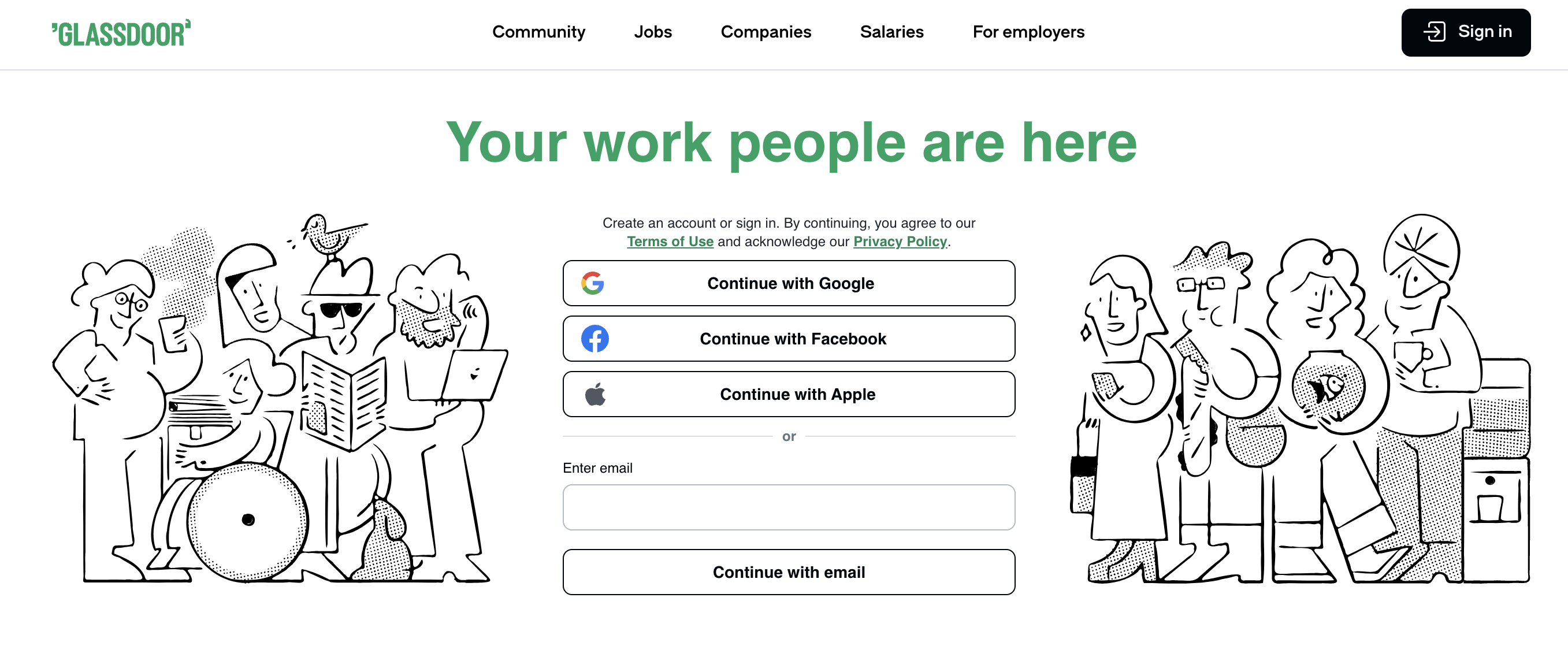
Some effective platforms to consider include LinkedIn Jobs for professional networking and detailed job postings, Indeed for its broad reach across various industries, and Glassdoor for enhancing your employer branding. Additionally, using Monster, CareerBuilder, and ZipRecruiter can help you access active job seekers and utilize AI-driven candidate matching for efficiency. The remaining platforms like Handshake, Dice, WayUp, and Idealist cater to specific audiences including college students, tech roles, and mission-driven organizations, ensuring you find the right fit for your management trainee program.
Keywords to Look for in Management Trainee Resumes
Resume screening is a crucial step in hiring Management Trainees. It helps you quickly identify candidates with the right skills and potential, saving time and resources in the recruitment process.
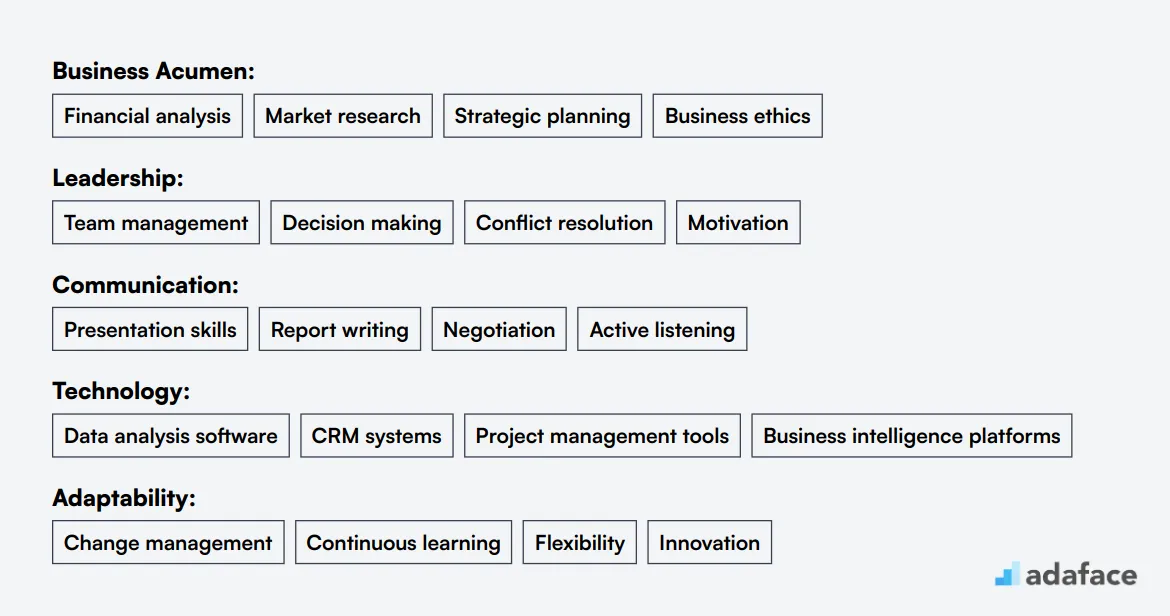
When manually screening resumes, focus on key terms related to business acumen and leadership. Look for phrases like 'strategic planning', 'team management', 'financial analysis', and 'project coordination'. Also, check for relevant educational backgrounds and internship experiences.
AI-powered tools can streamline the screening process. You can use large language models to analyze resumes based on specific criteria. This approach can be particularly helpful when dealing with a high volume of applications for Management Trainee positions.
Here's a sample prompt for AI-assisted resume screening:
TASK: Screen resumes for Management Trainee role
INPUT: Resumes
OUTPUT: For each resume, provide:
- Email id
- Name
- Matching keywords
- Score (out of 10 based on keywords matched)
- Recommendation
- Shortlist (Yes, No, or Maybe)
RULES:
- If unsure about a candidate's fit, mark as Maybe
- Keep recommendations concise
KEYWORDS:
- Business Administration degree
- Analytical skills
- Communication abilities
- Microsoft Office proficiency
- Project management
- Leadership experience
- Data analysis
- Strategic thinking
Recommended Skills Tests to Screen Management Trainees
To make informed hiring decisions, conducting skills tests for management trainees is recommended. These evaluations can help you identify candidates with the necessary skills to thrive in management roles. Here are our test recommendations:
- Management Trainee Test: Use our Management Trainee Test to evaluate candidates on key management skills. This test is tailored to assess how well they can handle managerial responsibilities and tasks.
- Critical Thinking Test: With the Critical Thinking Test, assess your candidates' ability to analyze complex problems and make well-reasoned decisions—an important skill for future managers.
- Communication Test: Evaluate candidates' communication skills with our Communication Test. Effective communication is a cornerstone of successful management, enabling clear interactions with team members and stakeholders.
- Leadership Psychometric Test: The Leadership Psychometric Test helps determine a candidate's leadership potential, focusing on traits that contribute to understanding team dynamics and inspiring others.
- Cognitive Ability Test: Utilize the Cognitive Ability Test to measure problem-solving capabilities and adaptability—skills that are highly beneficial in fast-paced management environments.
Case Study Assignments to Evaluate Management Trainee Candidates
Case study assignments can be valuable tools for assessing Management Trainee candidates. However, they come with drawbacks such as lengthy completion times, lower candidate participation rates, and the risk of losing qualified applicants. Despite these challenges, well-designed case studies can offer insights into a candidate's problem-solving and analytical skills. Let's explore some effective case study assignments for evaluating Management Trainees.
Business Expansion Strategy: This case study presents candidates with a fictional company looking to expand into new markets. Candidates must analyze market data, identify potential challenges, and propose a growth strategy. This assignment tests their analytical skills and ability to think strategically.
Operational Efficiency Improvement: Candidates are given a scenario where a company is facing operational inefficiencies. They must identify bottlenecks, suggest process improvements, and outline an implementation plan. This case study evaluates their problem-solving abilities and understanding of operational management.
Team Conflict Resolution: This assignment describes a workplace conflict scenario within a team. Candidates must propose a plan to address the issue, improve team dynamics, and enhance productivity. It assesses their interpersonal skills, leadership potential, and ability to handle challenging situations.
How to structure interview stage for hiring Management Trainees?
Candidates who successfully pass the initial skills tests should advance to technical interviews, where their hard skills are thoroughly evaluated. Skills tests are instrumental in filtering out unsuitable candidates, but they fall short of identifying the top talent for the role. Thus, conducting structured interviews is vital to ensure a comprehensive understanding of each candidate's potential.
Here are some interview questions to consider when hiring a Management Trainee: Can you describe a time when you demonstrated leadership skills? This assesses their potential to lead teams. How do you prioritize tasks when managing multiple projects? evaluates their organizational skills. Describe a situation where you had to solve a complex problem. helps gauge their problem-solving abilities. What strategies do you use to handle stress? gives insight into their emotional resilience. How do you approach learning new skills? explores their adaptability. Learn more about relevant behavioral interview questions.
Understanding the Costs of Hiring a Management Trainee
When considering the costs associated with hiring a Management Trainee, the average salary varies significantly by region. In the United States, for example, salaries range from $33,107 to $75,459, with an average of about $52,632. Similarly, in India, the average salary is around INR 770,378, while in Australia it hovers around $69,715 annually.
Management Trainee Salary United States
The average salary for a Management Trainee in the United States is approximately $52,632. Salaries typically range from a minimum of around $33,107 to a maximum of approximately $75,459. These figures may vary based on location, company size, and industry, but generally, Management Trainees can expect competitive compensation as they begin their careers.
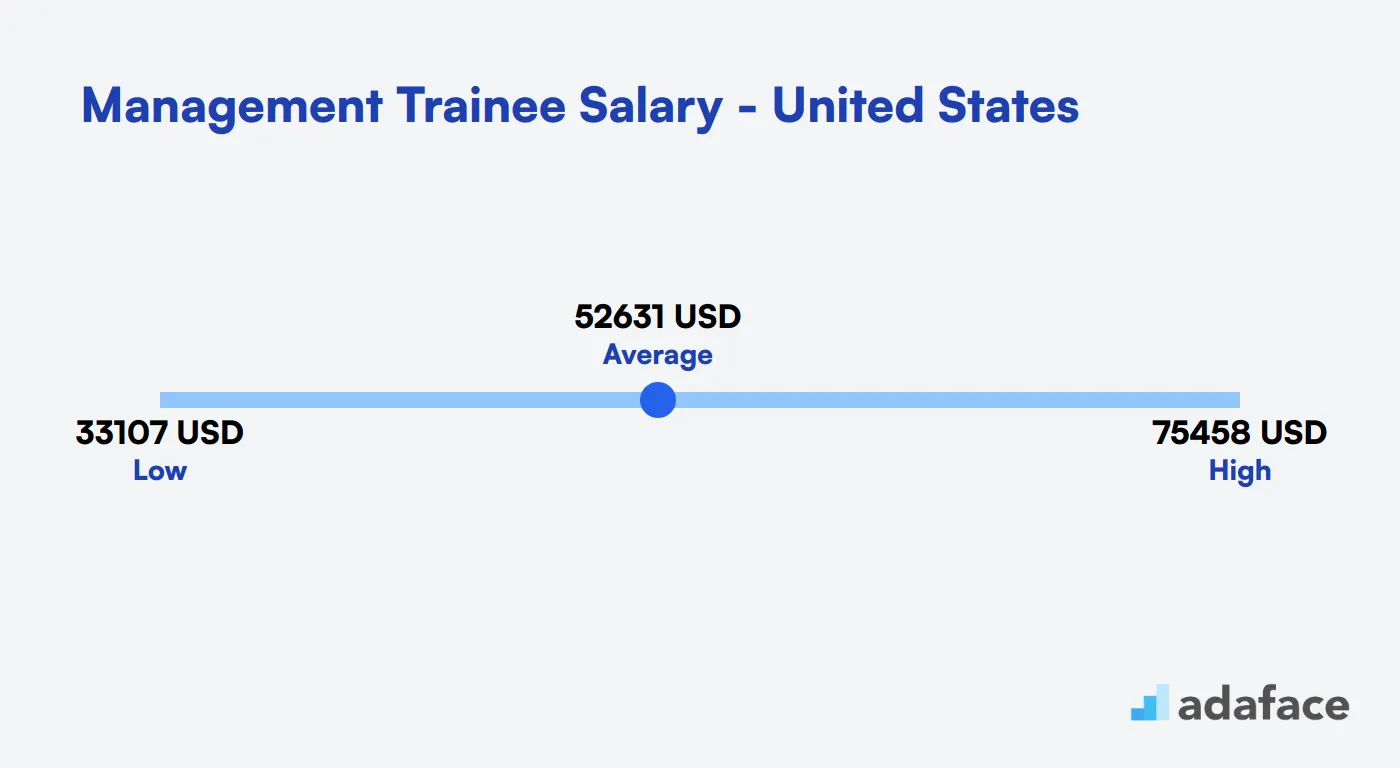
Management Trainee Salary in the United Kingdom
The average salary for a Management Trainee in the United Kingdom is approximately £25,000 to £30,000 per year. Entry-level positions might start around £20,000, while experienced trainees can earn up to £35,000 or more, depending on the industry and location. Overall, it's a competitive field, so being aware of these figures can help you attract top talent.
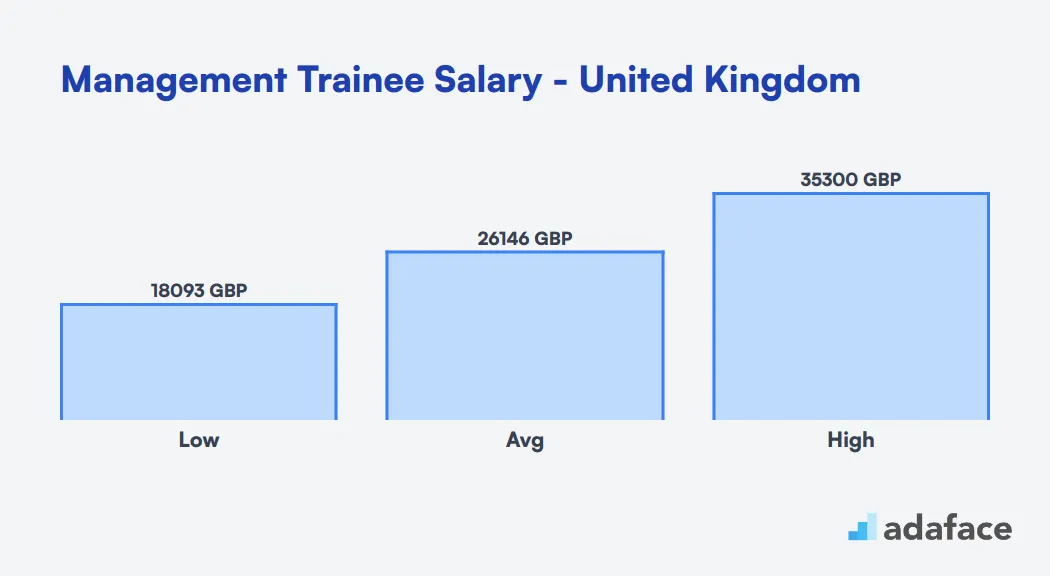
Management Trainee Salary in Australia
The average salary for a management trainee in Australia varies greatly by location, typically ranging from $49,856 to $92,060. On average, you can expect to pay around $69,715 annually. Notable differences across states include a median of $71,878 in Camperdown, NSW, and about $62,541 in Melbourne, VIC.
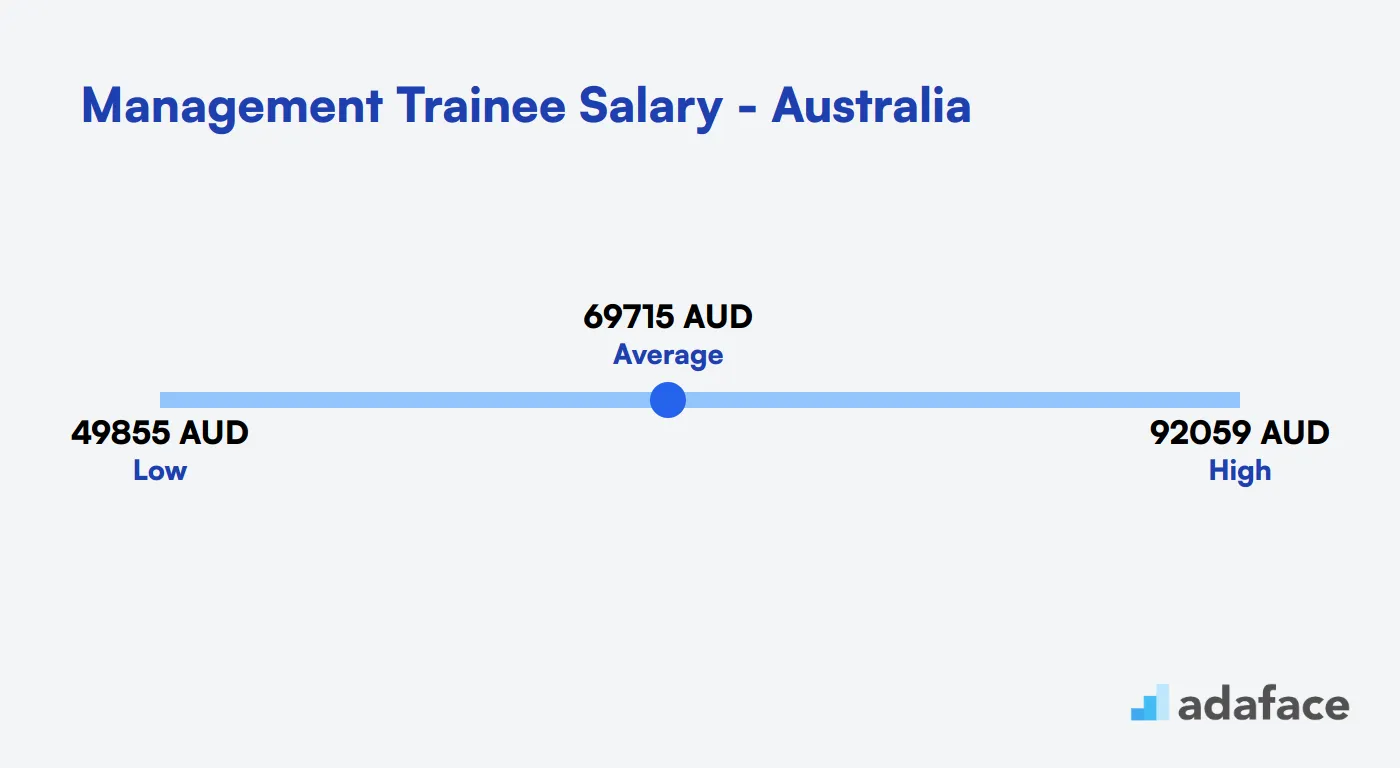
Management Trainee Salary in India
In India, the average salary for a Management Trainee varies based on location. Nationwide, the average salary is roughly INR 770,378, with the median at INR 653,924. Major cities like Mumbai and Bengaluru offer higher averages, around INR 1,133,081 and INR 1,123,725 respectively, while places like Patna and Noida have lower averages, about INR 245,404 and INR 254,239. Salaries can range from INR 145,182 to INR 1,787,921, depending on the city and company.
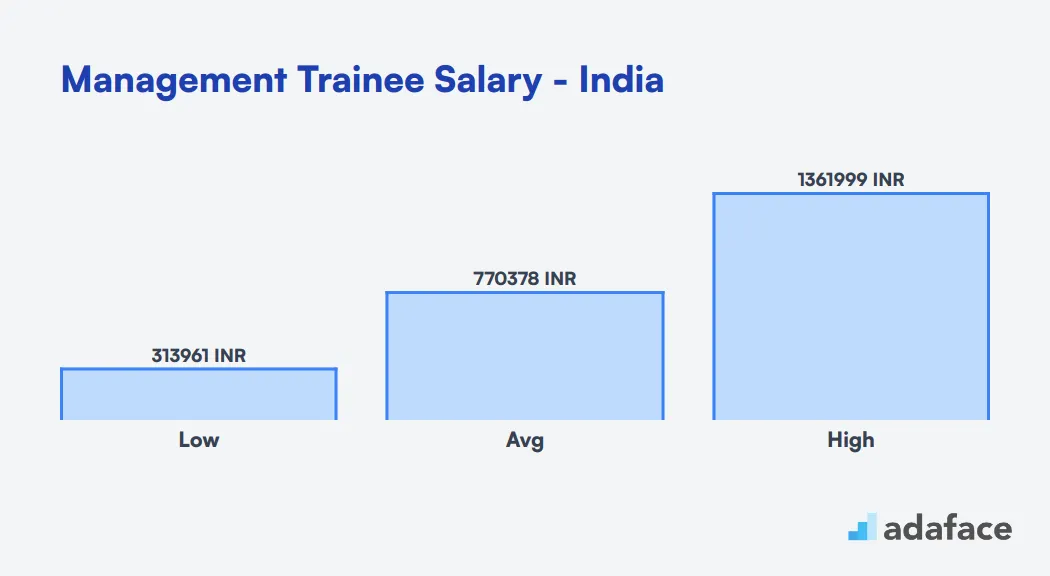
What's the difference between a Management Trainee and a Junior Manager?
Many people often confuse Management Trainees and Junior Managers as they both exist in the early stages of a career in management. However, these roles differ significantly in terms of responsibilities and experience. Understanding these distinctions can help recruiters and hiring managers make better hiring decisions.
A Management Trainee typically operates at an entry-level position, often fresh out of college with a Bachelor's degree. Their main responsibility is learning and assisting various departments without significant decision-making authority. They undergo a rotational program, reporting to senior management and focusing on broad management skills, with performance metrics centered around their learning and development.
In contrast, a Junior Manager usually has about 1-3 years of experience, holding a Bachelor's or Master's degree. They are responsible for leading small teams or projects and have moderate decision-making authority. Junior Managers focus on a specific department and report to middle managers, with their success measured against team or project outcomes.
| Management Trainee | Junior Manager | |
|---|---|---|
| Experience Level | Entry-level | 1-3 years |
| Education | Bachelor's degree | Bachelor's or Master's degree |
| Responsibilities | Learning and assisting | Leading small teams or projects |
| Decision-making Authority | Limited | Moderate |
| Training Focus | Broad management skills | Specific department or function |
| Career Path | Rotational program | Departmental specialization |
| Reporting To | Senior managers or executives | Middle managers |
| Performance Metrics | Learning and development goals | Team or project outcomes |
What are the ranks of Management Trainees?
The role of a Management Trainee can often be misunderstood, as it overlaps with various positions and responsibilities within an organization. Understanding the hierarchy can help clarify the different ranks and their respective responsibilities.
• Management Trainee: This is typically an entry-level position where individuals are exposed to various functions within the company. They are usually fresh graduates undergoing training to prepare for higher management roles.
• Assistant Manager: After gaining some experience, a Management Trainee may be promoted to Assistant Manager. In this role, they support managerial tasks and are often responsible for overseeing specific projects or teams.
• Manager: At this level, individuals are responsible for executing strategies and managing day-to-day operations. They have more decision-making power and are accountable for their team's performance.
• Senior Manager: This rank involves overseeing multiple teams or departments. Senior Managers develop strategic plans and drive the long-term vision of the organization.
• Director: Directors are responsible for strategic planning and high-level decision-making. They often manage several managers and ensure that the company’s goals align with its mission.
• Vice President (VP): The VP level is more executive, involved in shaping company policy and direction. They often have a significant impact on the organization's success and are responsible for various departments.
For more details on how to draft an effective job description, refer to our Management Trainee Job Description.
Hire the Best Management Trainees
In this blog post, we covered everything from understanding the role of management trainees to crafting effective job descriptions and structuring interviews. We delved into identifying key skills and qualifications, explored various platforms for hiring, and discussed the costs involved.
If there's one key takeaway, it's that hiring the right management trainees starts with a well-defined job description and utilizing the right skills tests. Consider using a Management Trainee Test to ensure candidates possess the necessary skills and aptitude. By focusing on these elements, you can streamline your hiring process and select the best candidates for your organization.
Management Trainee Test
FAQs
Look for a combination of soft and hard skills, including leadership potential, adaptability, problem-solving abilities, communication skills, analytical thinking, and a willingness to learn. Basic business acumen and relevant technical skills for your industry are also important.
Use a mix of behavioral interview questions, situational judgment tests, and case studies to evaluate leadership potential. Look for examples of initiative, team leadership in past experiences, and the ability to influence others. Consider using a leadership psychometric test for a more objective assessment.
Structure your interviews in multiple stages: an initial screening call, a skills assessment test, a panel interview focusing on behavioral and situational questions, and a final interview with senior management. This approach allows you to thoroughly evaluate candidates' skills, potential, and cultural fit.
While some work experience can be beneficial, it's not always necessary for management trainee positions. Focus more on the candidate's potential, learning agility, and transferable skills. Internships, volunteer work, or leadership roles in extracurricular activities can be good indicators of potential.
To attract top candidates, highlight your company's growth opportunities, mentorship programs, and professional development initiatives. Showcase your company culture and emphasize the potential for career advancement. Consider partnering with universities and attending career fairs to reach promising graduates.
Implement a diverse recruiting strategy by partnering with various universities and professional organizations. Use inclusive language in job descriptions, have a diverse interview panel, and consider blind resume screening to reduce unconscious bias. Set diversity goals for your management trainee program and track progress over time.
Management trainee programs typically last between 12 to 24 months. During this time, trainees often rotate through different departments to gain a broad understanding of the business. The duration can vary based on the company's needs and the complexity of the industry.

40 min skill tests.
No trick questions.
Accurate shortlisting.
We make it easy for you to find the best candidates in your pipeline with a 40 min skills test.
Try for freeRelated posts
Free resources



